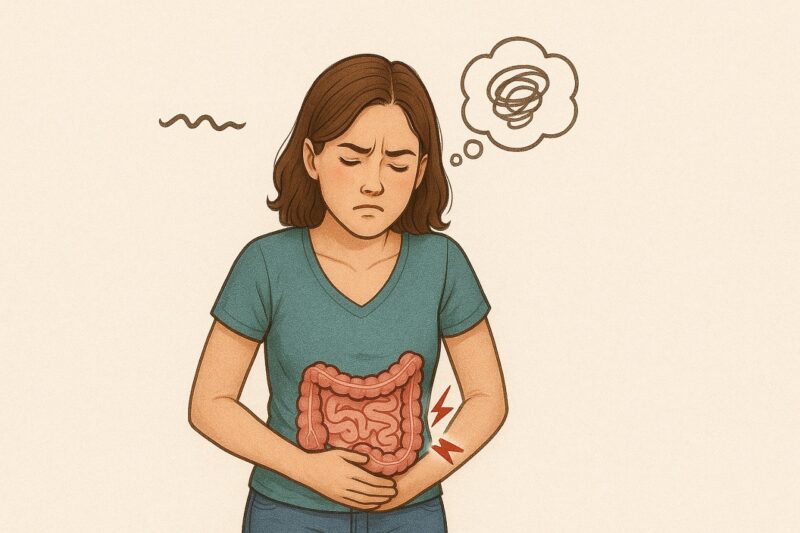When your stomach starts to protest – pain, bloating, maybe a frantic dash to the bathroom – it can knock out your whole day.
Irritable Bowel Syndrome (IBS) affects how you sleep, how you socialize, and sometimes even how you show up at work. And for millions of people around the world, flare-ups are part of the routine.
Diet changes often steal the spotlight when it comes to managing IBS. And yes, they matter. But focusing on food alone misses a big part of the picture.
IBS is a multifaceted condition, and your gut is deeply connected to your nervous system, your stress levels, your daily habits – even how you move and sleep.
Let’s take a closer look at what you can actually do to manage IBS flare-ups when food isn’t the whole answer.
1. Lifestyle Shifts That Actually Make a Dent
Sometimes the most effective IBS tools don’t come in a bottle – they come from the choices you make day to day. And while that’s not always easy, even small changes can pay off.
The Role of Targeted Support

In addition to nutritional guidance and lifestyle changes, functional medicine doctors frequently turn to carefully selected supplements as part of an integrative IBS care plan.
The right IBS care supplements can help:
- Balance the gut microbiota, addressing overgrowth of harmful bacteria or yeast
- Support the gut lining to reduce intestinal permeability (“leaky gut”)
- Calm local inflammation and modulate immune responses in the digestive tract
- Soothe the gut-brain axis, making the body less reactive to everyday stressors
Stress Management
Stress isn’t just “in your head” – it hits your gut hard. Your intestines have their own nervous system (the enteric nervous system), and they respond dramatically to emotional stress.
Deep breathing, guided imagery, progressive relaxation – these are more than feel-good ideas. They’re actual tools for gut relief.
A few practical ways to lower stress:
- Take 10–15 minutes each morning or evening for guided meditation or breathwork.
- Try journaling your symptoms alongside stressful events to see if you notice patterns.
- Avoid stimulants like nicotine and excess caffeine, which can irritate the gut lining.
Move Your Body – Gently
You don’t need to sign up for a triathlon. In fact, intense workouts might actually make symptoms worse for some.
But consistent, low-impact movement can be incredibly helpful – especially for constipation.
Good options:
- 30 minutes of brisk walking most days
- Gentle yoga (poses like Cat-Cow or Child’s Pose can ease cramps)
- Swimming or cycling at a steady pace
Movement helps keep digestion flowing, and it also helps regulate your nervous system.
Sleep Isn’t Optional
There’s a tight link between gut and sleep. Poor-quality sleep can make pain and bloating worse. IBS symptoms can also interrupt your rest. It becomes a vicious cycle.
Some tips to break that loop:
- Stick to a consistent bedtime – even on weekends.
- Avoid screens an hour before sleep.
- Keep your room cool, quiet, and dark.
- Avoid large meals close to bedtime.
2. Medications That Target Symptoms, Not Just the Cause
IBS doesn’t have a cure. But certain medications can help take the edge off when symptoms get bad. Here’s a look at common options:
| Medication Type | Examples | Helps With | Notes |
| OTC Relief | Loperamide (Imodium), Simethicone, Peppermint oil | Diarrhea, gas, pain | Peppermint oil has some science behind it – shown to ease pain in a 2019 meta-analysis |
| Antispasmodics | Dicyclomine, Hyoscine | Abdominal cramps, spasms | Helpful for sudden gut contractions |
| Laxatives | Lubiprostone | Constipation (especially in women) | Stimulates fluid in the intestines |
| Guanylate cyclase-C agonists | Linaclotide | IBS-C (constipation dominant) | Works by increasing secretion and motility |
| Antibiotics | Rifaximin | SIBO (small intestinal bacterial overgrowth) | May rebalance gut flora temporarily |
| Antidepressants | Citalopram, Imipramine | Pain and gut-brain signaling | Often used when anxiety plays a major role |
3. Probiotics and Prebiotics

Your gut is home to trillions of microbes. And when the balance gets thrown off, symptoms can flare.
That’s where probiotics come in. Certain strains – like Bifidobacterium infantis – have shown promise in easing IBS symptoms. They don’t work for everyone, but they’re generally safe to try for a month or two. Look for products with clear strain labeling and high CFU counts (colony forming units).
Prebiotics, like inulin and fructooligosaccharides (FOS), feed the good bacteria. They can be helpful, but for some IBS patients, they actually increase gas and bloating. So introduce them slowly, and monitor how your body reacts.
You don’t need to be on a probiotic forever. Think of it as one tool in the kit – worth trying, but not magic on its own.
4. Alternative Therapies That Actually Have Backing
Not every alternative therapy is backed by strong science – but some are gaining credibility.

Acupuncture
It’s not just placebo. There’s growing evidence that acupuncture may help reduce abdominal pain and improve gut motility in some IBS patients. It’s worth exploring if you’re open to it, especially if meds haven’t been enough.
CBT (Cognitive Behavioral Therapy)
This is a big one – especially if stress is a clear trigger for you. CBT helps you reframe negative thought patterns and build coping strategies.
In IBS, it’s been shown to reduce symptom severity significantly. If you can’t access a therapist in person, many online CBT programs now cater specifically to IBS.
Symptom Tracking
Sounds simple, but keeping a symptom journal can be incredibly powerful. Track things like:
- Stool consistency and frequency
- Pain levels
- Stressful events
- Sleep quality
- Medications or supplements taken
Over time, you’ll start to notice patterns – and that can help you tailor your relief strategies more effectively.
When It’s Time to Call a Doctor
You don’t need to suffer in silence. IBS is real, and so is the impact it has on your life.
You should absolutely check in with a healthcare provider if:
- You’re seeing blood in your stool
- You’ve lost weight unintentionally
- Your symptoms are waking you up at night
- You’re over 50 and noticing new or changing symptoms
- You feel faint, feverish, or dehydrated
Sometimes stronger prescriptions like Viberzi or Xifaxan are needed. And in some cases, your doctor may want to run tests to rule out other conditions like celiac disease, Crohn’s, or colon cancer.
Daily Management Tips That Actually Work
Let’s get down to the nitty-gritty. Here’s what a day might look like for someone managing IBS flare-ups with a holistic approach:
| Daily Practice | Why It Helps |
| Keep a symptom log | Reveals triggers, tracks progress |
| 30 mins of light exercise | Promotes digestion and reduces tension |
| Morning tea (peppermint or ginger) | Calms spasms, reduces nausea |
| Deep breathing or meditation | Lowers gut-inflaming stress hormones |
| Avoid trigger habits (excess coffee, skipping meals) | Keeps digestion steady |
| Heating pad at night | Eases pain and cramping before bed |
A Final Thought
There’s no one-size-fits-all solution for IBS. That’s the frustrating part – but also the empowering part. You’re not stuck with symptoms that just happen to you. You can build a toolkit that works.
Managing flare-ups takes a mix of strategies – medications when needed, mindful movement, consistent sleep, and emotional care. And while diet is a piece of the puzzle, it’s not the whole story.
You deserve to feel better – and it’s okay to take a bit of trial and error to get there. With the right mix of support and self-awareness, flare-ups don’t have to run your life.















